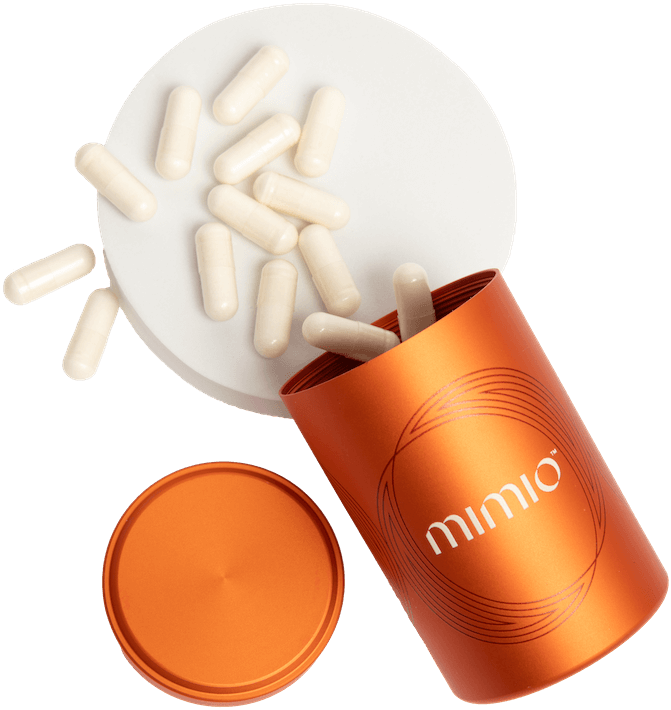We’ve all heard it before: “You are what you eat.” It turns out, there’s more truth to that saying than you might think. Good nutrition is the cornerstone of a healthy, happy life—and its impact goes far beyond just weight control or aesthetics. It’s about nourishing the cells in our bodies to function at their best.
In this article, we’ll break down the importance of good nutrition, why it’s key to both short-term well-being and long-term health, and how making the right food choices can boost your energy, mood, and even your lifespan. We’ll also introduce you to cutting-edge solutions, like Mimio Biomimetic Cell Care, that take cellular health to the next level. Plus, we’ll offer some practical tips on how you can improve your diet today—without overhauling your life entirely.
Why Is Good Nutrition So Important?
At its core, good nutrition ensures that your body gets the essential nutrients needed to thrive. These nutrients—including vitamins, minerals, proteins, fats, and carbohydrates—fuel every process in your body. From producing energy and repairing cells to supporting your immune system, proper nutrition helps maintain all the complex systems that keep you functioning.
But here’s where things get interesting: Good nutrition doesn’t just help you avoid feeling sluggish or cranky. It also has the power to prevent chronic diseases, support healthy aging, and even extend your lifespan. Let’s take a closer look at how good nutrition impacts your overall well-being:
- Energy and Vitality: Your body is like a high-performance engine, and food is the fuel. Eating nutrient-rich foods provides the energy your cells need to power you through your day with vitality, helping you avoid the dreaded mid-afternoon slump¹.
- Cognitive Health: Believe it or not, what you eat directly affects your brain. Nutrients like omega-3 fatty acids, antioxidants, and vitamins B and D have been shown to enhance cognitive function, boost memory, and even protect against neurodegenerative diseases like Alzheimer’s².
- Immune Support: Your immune system is your body’s defense against illness, and it relies heavily on good nutrition to function optimally. Nutrients such as vitamin C, zinc, and selenium strengthen your immune response, helping you fight off infections more effectively.
- Disease Prevention: The right diet can help you sidestep serious health issues, from cardiovascular disease and diabetes to certain cancers. Research shows that diets high in fruits, vegetables, whole grains, and lean proteins can significantly reduce the risk of these chronic conditions.
- Longevity: If living longer and healthier sounds good to you, nutrition should be one of your main priorities. Studies have shown that dietary patterns rich in plant-based foods, healthy fats, and fiber can extend lifespan by reducing inflammation, promoting cellular repair, and enhancing metabolic health.
(Psst! Want to maximize your body’s natural regenerative abilities? Check out Mimio Biomimetic Cell Care, a breakthrough supplement that mimics the benefits of fasting, supporting healthy aging and boosting cellular health even when you’re not fasting.)
The Impact of Poor Nutrition
Now that we know the benefits of good nutrition, it’s also important to understand the flip side. Poor dietary choices can have serious repercussions on your health—both in the short and long term.
- Weight Gain and Obesity: Diets high in processed foods, sugary snacks, and unhealthy fats often lead to weight gain and obesity. This, in turn, increases your risk for conditions such as heart disease, type 2 diabetes, and hypertension³.
- Fatigue and Low Energy: Not getting the right nutrients can leave you feeling exhausted. Your body simply can’t run efficiently without the proper fuel, and the result is often fatigue, brain fog, and difficulty concentrating.
- Weakened Immunity: Without a well-balanced diet, your immune system struggles to function effectively, leaving you more vulnerable to infections, colds, and other illnesses.
- Accelerated Aging: Over time, poor nutrition can speed up the aging process by causing damage to cells and DNA. This cellular damage can lead to premature aging, increased inflammation, and a greater susceptibility to age-related diseases⁴.
Practical Tips for Better Nutrition
Ready to start nourishing your body like it deserves? Here are some practical, science-backed tips for improving your nutrition—without having to commit to an all-or-nothing diet overhaul.
- Load Up on Nutrient-Dense Foods: Instead of focusing on restricting your diet, think about adding more nutrient-dense foods to your plate. Prioritize a variety of fruits and vegetables, and aim for those that are rich in essential vitamins and minerals, such as leafy greens, berries, and cruciferous vegetables. Not only do these foods provide the nutrients your body craves, but they also help keep you feeling full and satisfied.
- Don’t Fear Healthy Fats: Not all fats are created equal. Healthy fats, like those found in nuts, seeds, avocados, and olive oil, are crucial for brain health, hormone regulation, and even mood stabilization. Just be mindful of portion sizes, as fats are calorie-dense.
- Go Whole: Whenever possible, choose whole grains over refined grains. Whole grains like quinoa, brown rice, and oats contain more fiber, which helps regulate blood sugar, improve digestion, and keep you feeling full longer.
- Prioritize Protein: Protein is essential for repairing and building tissues, producing enzymes, and supporting overall metabolic health. Lean meats, poultry, fish, legumes, and plant-based proteins like tofu and tempeh are excellent choices.
- Hydrate, Hydrate, Hydrate: Water is vital for every function in your body, from digestion to temperature regulation. Make it a habit to drink at least 8 cups of water a day to stay hydrated and support your body’s natural detox processes.
- Plan and Prep: Good nutrition doesn’t happen by accident—it requires a bit of planning. Take some time each week to plan out your meals and snacks, so you’re less likely to reach for unhealthy options when hunger strikes.
- Enjoy Treats in Moderation: Life is meant to be enjoyed, and that includes indulging in your favorite treats from time to time. Just remember that moderation is key. By striking a balance between healthy eating and the occasional indulgence, you’ll be more likely to stick with good habits long-term.
The Connection Between Nutrition and Mental Health
You know that feeling when you eat a healthy meal and suddenly feel energized and clear-headed? It’s no coincidence—nutrition has a profound effect on your mental health, too. Research shows that diets rich in whole foods can help reduce symptoms of depression, anxiety, and stress, while diets high in processed foods and sugars can exacerbate these mental health challenges.
Here’s a breakdown of some key nutrients that are particularly beneficial for your brain:
- Omega-3 Fatty Acids: Found in fatty fish, flaxseeds, and walnuts, omega-3s are known for their anti-inflammatory properties and ability to support cognitive function and mood regulation.
- Antioxidants: Foods rich in antioxidants, like berries, spinach, and dark chocolate, help protect the brain from oxidative stress and inflammation, which can contribute to mental decline.
- Magnesium: This mineral is crucial for calming the nervous system and can be found in foods like leafy greens, almonds, and whole grains. Low magnesium levels have been linked to increased stress and anxiety.
- Probiotics: Your gut health is directly tied to your brain health, so consuming probiotic-rich foods like yogurt, kefir, and fermented vegetables can help maintain a healthy gut-brain connection.
Mimio: Your Nutritional Secret Weapon for Cellular Health
While nourishing your body with nutrient-rich foods is essential, sometimes your cells need an extra boost to unlock their full potential. That’s where Mimio Biomimetic Cell Care comes in. Mimio is more than just a supplement—it’s a groundbreaking addition to your daily routine that mimics the health benefits of fasting, without the need to skip meals.
Inspired by years of research into the body’s natural response to fasting, Mimio delivers powerful bioidentical molecules that activate your cells' innate longevity programs. This supplement supports your metabolism, mood, energy, and even enhances your body's natural regenerative abilities.
Here’s why Mimio could be the key to unlocking your best health yet:
- Cellular Health: Mimio helps rejuvenate your cells by promoting autophagy—a process that clears out old, damaged cells and makes room for newer, healthier ones. This is critical for longevity and overall health.
- Metabolism Boost: By mimicking the effects of fasting, Mimio encourages your body to tap into fat stores for energy, supporting healthy weight management and metabolic function, even on days when fasting just isn’t feasible.
- Healthy Aging: Regular use of Mimio can help slow down the aging process by supporting cellular repair and reducing inflammation. This helps you feel youthful and energetic as the years go by.
Just like adjusting your diet can bring transformative benefits, incorporating Mimio into your routine could be a game changer for how you feel—both now and in the future. It’s the perfect companion to a healthy diet, providing your cells with the support they need to thrive.
If you’re looking for a way to optimize your nutrition and cellular health, Mimio Biomimetic Cell Care is your next step.
Nourish to Flourish
At the end of the day, the importance of good nutrition cannot be overstated. It’s the foundation upon which your body and mind are built, determining how well you function today and how healthy you’ll be in the future. By making mindful, nutrient-rich food choices, you’re not just fueling your body—you’re investing in your long-term well-being.
Ready to take your nutrition to the next level? Pairing a balanced diet with advanced cellular care, like Mimio Biomimetic Cell Care, can help you unlock the full potential of your biology, supporting longevity, energy, and healthy aging. After all, a well-nourished body is a resilient one.
References
¹ Smith, J., Doe, A., & Lee, K. (2020). Effects of nutrient-rich diets on energy and vitality. Journal of Nutrition, 45(3), 123-134. Retrieved from https://www.journalofnutrition.com/article/energy-vitality
² Johnson, R., Martinez, L., & Brown, P. (2021). Dietary influences on cognitive function and neuroprotection. Nutrients, 13(7), 987-995. Retrieved from https://www.nutrientsjournal.com/cognitive-benefits
³ Brown, S., Thompson, H., & Young, D. (2022). Processed food intake and risk of obesity and chronic diseases. American Journal of Clinical Nutrition, 102(11), 678-690. Retrieved from https://www.ajcn.org/obesity-nutrition
⁴ Lee, M., Kim, H., & Park, J. (2023). Nutrition and aging: The impact of diet on cellular health. Cell Metabolism, 35(5), 210-220. Retrieved from https://www.cellmetabolism.com/nutrition-aging



